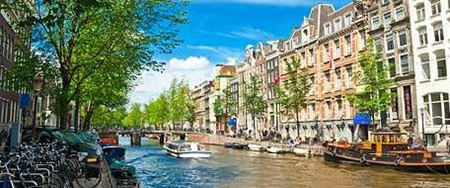The Netherlands: Culture and Tradition
The Netherlands is a country on the coast of the North Sea in northwest Europe. It is part of the Benelux; which also includes Belgium and Luxembourg. These countries are known as the “low countries” because much of the land is exactly at or below sea level.
This blog will discuss the culture and tradition of the Netherlands, as well as information for global companies looking to expand into this market.
History
Julius Caesar discovered the Netherlands and it was under Roman rule until 13 B.C. Later, it passed into the hands of Burgundy and the Austrian Hapsburgs, and in the 16th century, came under Spanish rule.
The Dutch were finally given their independence after a war between the United Provinces and Spain in the 17th century.
The Dutch East India Company was established in the 17th century, making the Netherlands one of the greatest sea and colonial powers of Europe.

The Capital
The colorful city of Amsterdam is the capital of the Netherlands. It is known for its beautiful artistic heritage, a canal system that runs through the city, over 400 km of cycle paths and its long narrow houses called “Herenhuizen”.
This city is also known for its museum district with famous paintings by Rembrandt and Vermeer at the Rijksmuseum, the Van Gogh Museum and modern art at the Stedelijk.
Dutch Facts
- The island of Mauritius in the Indian Ocean was named after the Dutch city holder Prince Maurice of Nassau in 1598.
- In the 17th century the Dutch were the first to discover Australia and New Zealand.
- The first orange colored carrot appeared in the Netherlands. They were only white, yellow, black, purple or red before that.
- New York City was started as a Dutch colony and was originally called New Amsterdam.
- The Dutch people are known as the tallest people in the world.
- Giethoorn, a city in the province of Overijsel, does not have any roads and is known as “Venice of the Netherlands” because all the transportation is done over water.
- The Dutch anthem is the oldest song written and was first used in 1568.
The Economy
The Netherlands has as an open economy and is politically and financially stable.
The Netherlands is one of the five biggest exporters in the world. The biggest exports that come out of this country are agricultural. The Netherlands is known for their innovations and advancements in the agricultural industry, especially sustainable farming.
The Global Connectedness Index 2012, computed on data from 2005 to 2011, ranked the Netherlands as the world’s most internationally connected country.
Rotterdam, a city laid in South Holland, is the largest seaport in Europe.
Doing Business in the Netherlands
According to the World Bank Group’s Doing Business 2015 report, the ease of doing business in the Netherlands is good. They are currently ranked 27th out of 189 economies.
If you are looking to start a business in the Netherlands, there were changes made in 2013 and 2014 that make that process easier. In 2013, the Netherlands eliminated the requirement for a declaration of non-objection by the Ministry of Justice before incorporation. In 2014, they abolished the minimum capital requirement.
The Netherlands ranks 13th out of 189 economies in ease of trading across borders. In 2014, they made moves to boost international trade competitiveness by introducing tools to help facilitate trade. These tools included risk based inspections and electronic data interchange systems.
Conclusion
Even though the Netherlands is a small country, it has a rich cultural history that extends beyond windmills.
One of its strengths is its position as an agricultural hub that lends its expertise to farmers around the world. The Netherlands continues to make improvements to its laws and regulations which attract global companies and increases its international competitiveness.
